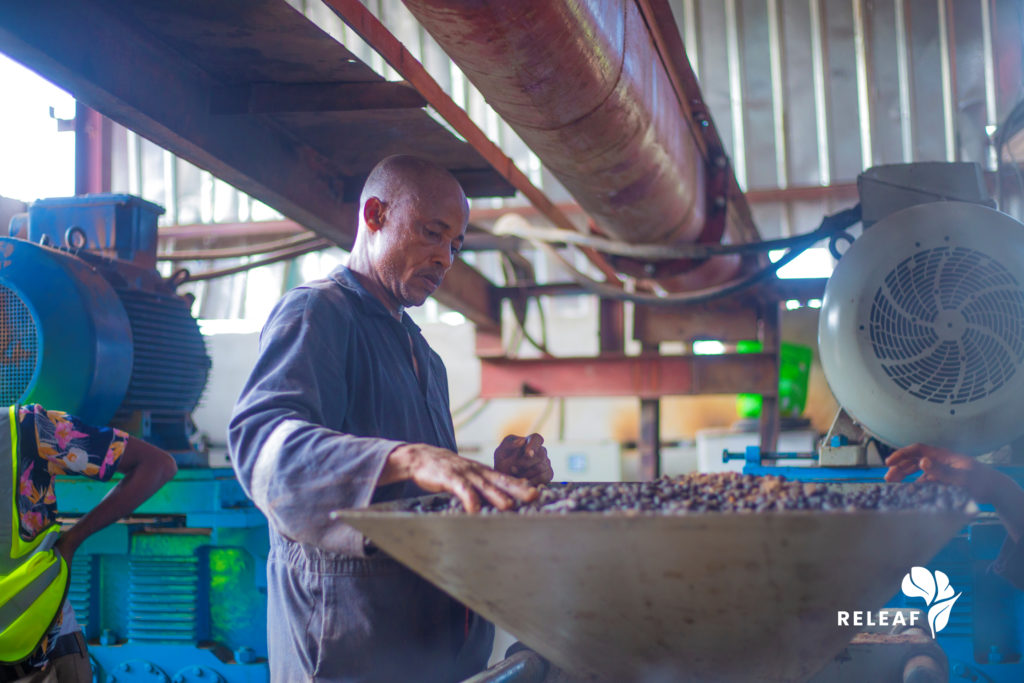Releaf, a Nigerian agriculture technology company that develops proprietary hardware and software solutions to drive the industrialisation of food processing in Africa, has raised $4.2 million in seed funding and grants to scale its technology solution for the Oil Palm sector in Nigeria.
Of the total investment, $2.7 million is an institutional seed funding led by Samurai Incubate Africa, Future Africa and Consonance Investment Managers with participation from Stephen Pagliuca, Chairman of Bain Capital and Justin Kan of Twitch. Releaf also secured $1.5 million in grants from The Challenge Fund for Youth Employment (CFYE) and USAID.
The startup plans to channel the $2.7 million seed funding into the scaling of its industrial oil palm processing technology; on the other hand, the $1.5 million grant will serve as working capital and help in pushing other value-added services for smallholders and small-scale processors. For instance, the grant will support the startup’s plan to train, recruit and retain more women and youth in the Nigeria Oil Palm sector.
Releaf’s founding story
In 2015, six American-Nigerian cousins founded a non-profit organisation to empower the African continent with the best talent in the diaspora. This organisation pumped over 120 people into the agricultural sector and it was called The Releaf Group.
Two years later, Ikenna Nzewi and Uzoma Ayogu, two of the cousins, pivoted Releaf into a for-profit business to set up small factories near farm settlements so that smallholder farmers can have their produce processed in a short time and make more money while spending less.
But the business struggled to scale as the founders couldn’t figure out the product-market fit because of their very little understanding of the agricultural business landscape.
Ikenna and Uzoma moved to Nigeria and invested in unbundling the complexities of the sector’s value chain. They travelled across 20 states in Nigeria in six months and studied eight different crops value chains.
“We bought and sold various agricultural commodities, trying to get an accurate understanding of how specific value chains function and we investigated opportunities to develop technology to catalyze their industrialization. After several months of exploration, we discovered that the biggest challenge food factories faced was securing enough quality raw material to fulfil their growing demand.” Nzewi told TechCabal.
This sojourn exposed them to many lucrative crop markets; but at the end of their iteration, they decided to focus on the oil palm market. But why oil palm?
Nzewi said the oil palm value chain represents a great place to start their journey of addressing this challenge but they are certainly exploring other opportunities to drive efficiencies and profitability across other value chains. This means that the oil palm market is the best entry point to scale.
The Nigeria oil palm market
According to a PWC’s report, the oil palm market in Nigeria is estimated at $3 billion with a pool of over 4 million smallholder farmers and over 80% of the oil palm production are attributed to these smallholder farmers.
In the early 1960s, Nigeria was the world’s largest palm oil producer with a global market share of 43%. Today, it is the 5th largest producer with less than 2% of the total global market production of 74.08 million MT. Although production has fallen, Nigeria still remains the largest consumer of palm oil in Africa and this means demand is more than supply.
There are few reasons behind this shortfall and one of them is because production still relies heavily on ineffective processes. For instance, If you’ve been to an oil palm farm before, you will see how farmers, their family and employed labourers use rocks and other inappropriate hardware to crack the nuts open and extract vegetable oil. This inefficiency and archaic processes lead to long production duration and low-quality end products.
Introducing the solution that will RELEAF this sector
The startup, after getting an idea of the complexities of the oil palm market, especially the hardware, built Kraken, their proprietary technology that helps farmers crack oil palm nuts.

Kraken isn’t a tool built in small units to be dispatched to farmers to use on their own. Kraken is an industrialised machine that swallows palm kernel nuts, crack them, crush the seeds inside, and then spit out the oil. So the company relies on smallholder farmers to supply them with nuts for Kraken to process. After that, the company sells the oil to FMCG and other manufacturers.
Kraken processes 500 tonnes of palm nuts per week. But the problems of agriculture can’t be solved by using proprietary hardware alone, it is important there is software doing more. Releaf’s software helps in connecting with farmers and keeping track of their supplies.
The software offerings also allow Releaf to receive inbound supply requests from farmers via USSD, provide working capital financing as well as collect proprietary data on supply availability. The software reportedly has more than 2,000 smallholder farmers who have supplied over 10 million kilograms of quality palm kernel nuts to food factories.
“We started financing as a pilot in March this year and it has quickly grown to be our smallholders’ favourite value-added service from Releaf. He said the company disburses up to $1,000 on a one month tenure at a 5% interest rate and repayment is made in palm nuts (at market price). So far, the default rate has been <1%.” Nzewi said when asked how much Releaf has disbursed to farmers per its credit financing.
“Our focus is on deepening the value we offer to farmers so you may not see that we have disbursed loans to 100,000 farmers in the first year, but you will see that many of our farmers are tripling, quadrupling or 5xing their income, and that’s where our focus is.” He added.
While speaking on the round, Nzewi said “given Nigerians spend an estimated 60% of their income on food and Africa’s population is set to increase by 100,000 people per day over the next three decades, we’re presented with an incredible opportunity to feed more people, reduce consumer costs, and supply the fastest-growing food market in the world.”
“Releaf is committed to harnessing technology to accelerate the economic wealth of rural, agrarian societies throughout the Continent. We firmly believe that a robust real economy is the foundation for long-lasting and shared prosperity for Africans and are excited to deepen partnerships with like-minded organizations, governments, and firms.”
This new funding will enable better productivity and accelerate the eradication of the menial and archaic processes that are prevalent across Nigeria’s oil palm sector and the agriculture sector as a whole. It will also enable Releaf to drive more value and profitability across the oil palm value chain, as well as support direct and ancillary job creation in the farming communities of South and Eastern Nigeria.
Rena Yoneyama, Managing Partner at Samurai Incubate Africa who led the round had this to say about the agritech business:
“Releaf’s novel approach to operating within the value chain with proprietary technology set it aside from many agritech startups we have spoken to. We believe the firm’s thesis on decentralizing food processing would have a strong match with Africa’s economic development landscape for the next few decades. Ikenna and Uzo are the perfect founders to disrupt this market in Nigeria and beyond. We are thrilled to back them as they innovate in providing both agro-processing and financial services to rural communities and farmers.”
Iyin Aboyeji, General Partner at Future Africa, whose venture also wrote a check, said “the team at Releaf is building the agro-allied industry of the future from the ground up starting with palm oil which they have developed novel technology to aggregate, deshell and process into critical ingredients like vegetable oil and glycerine. Future Africa is delighted to back Releaf to build the future of modern agriculture”
“We are thrilled to partner with Releaf on their mission to improve efficiency and profitability for farmers and food factories in Africa. The founders’ vision and the team’s enthusiasm gave us confidence that Releaf will deliver real value for rural communities and create digital/technical jobs for women and youth. We are looking forward to their results and success over the coming years and continuing to support their work.” Dr. Nneka Enwonwu, Country Relationship Manager at The Challenge Fund for Youth Employment (CFYE) said.
Where expansion plans are concerned, Nzewi told TechCabal that the plan in the short term is to expand geographically before expanding into new crops.
“Oil palm processing and cultivation across West Africa is very similar so it would be easier for us to replicate the model that we know already works across the region. Next, we’ll work with crops that have strong biological characteristics relative to their substitutes and can be planted alongside oil palm to maximise yields on planted land.”





















